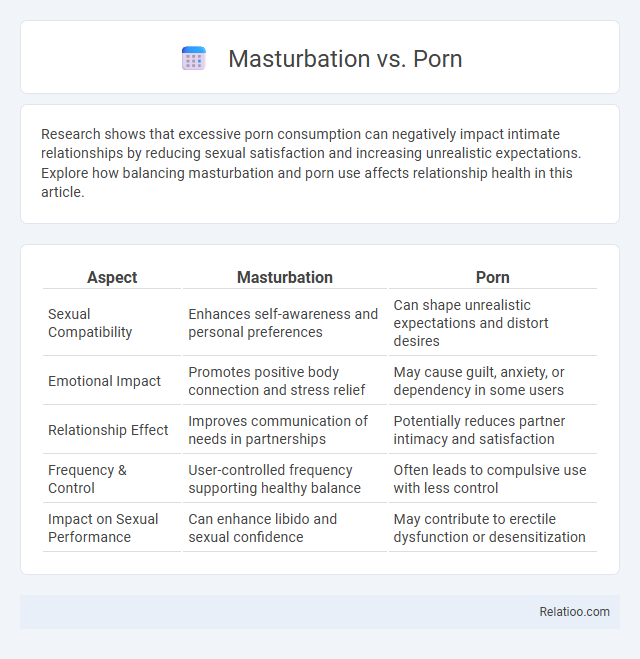Research shows that excessive porn consumption can negatively impact intimate relationships by reducing sexual satisfaction and increasing unrealistic expectations. Explore how balancing masturbation and porn use affects relationship health in this article.
Table of Comparison
| Aspect | Masturbation | Porn |
|---|---|---|
| Sexual Compatibility | Enhances self-awareness and personal preferences | Can shape unrealistic expectations and distort desires |
| Emotional Impact | Promotes positive body connection and stress relief | May cause guilt, anxiety, or dependency in some users |
| Relationship Effect | Improves communication of needs in partnerships | Potentially reduces partner intimacy and satisfaction |
| Frequency & Control | User-controlled frequency supporting healthy balance | Often leads to compulsive use with less control |
| Impact on Sexual Performance | Can enhance libido and sexual confidence | May contribute to erectile dysfunction or desensitization |
Understanding Masturbation and Porn: Key Differences
Understanding masturbation involves recognizing it as a natural and healthy sexual activity that allows Your body to explore pleasure independently. In contrast, porn consumption introduces external visual stimuli that can influence sexual expectations and behavior. Differentiating these helps in maintaining a balanced relationship with both personal sexual expression and media consumption.
Historical Perspectives on Masturbation and Pornography
Historical perspectives on masturbation reveal it was once heavily stigmatized, often linked to moral and health concerns from the 18th to 19th centuries, while pornography faced varying degrees of censorship and legal restriction over time. Early medical texts like Samuel Tissot's "Onanism" in the 18th century exemplify the pathologization of masturbation, contrasting with the evolving presence of erotic art and literature that foreshadowed modern pornography. The gradual shift through the 20th century toward more liberal attitudes reflects changing societal views influenced by psychoanalysis, sexual liberation movements, and the digital age's impact on access to sexual content.
Psychological Effects of Masturbation vs Porn Consumption
Masturbation often promotes stress relief, improved mood, and enhanced self-awareness by releasing endorphins and reducing cortisol levels. In contrast, excessive porn consumption can contribute to anxiety, reduced satisfaction with real-life partners, and potential addiction due to overstimulation of dopamine pathways. Understanding your psychological response to each activity helps maintain a healthy balance and supports mental well-being.
Impact on Sexual Health and Wellbeing
Masturbation promotes sexual health by reducing stress, enhancing mood, and improving sleep quality, while excessive pornography consumption can lead to unrealistic expectations and decreased sexual satisfaction. Balancing your use of pornography with mindful masturbation practices supports emotional wellbeing and healthy sexual functioning. Prioritizing self-awareness helps mitigate negative impacts and fosters a positive connection with your sexuality.
Masturbation vs Porn: Influence on Relationships
Masturbation and porn consumption can differently impact relationships, influencing intimacy and emotional connection. Excessive reliance on porn may create unrealistic expectations and reduce satisfaction, while masturbation focusing on self-awareness tends to support healthy sexual expression. Balancing your personal habits with open communication helps maintain trust and strengthen emotional bonds.
The Role of Technology in Shaping Sexual Behaviors
Technology has profoundly influenced sexual behaviors by shaping how individuals access and engage with content, with pornography platforms significantly increasing the availability and variety of explicit material. The rise of mobile devices and high-speed internet has made masturbation increasingly intertwined with digital media consumption, altering traditional patterns of solo sexual activity. Understanding your relationship to these technologies can help manage their impact on sexual health and wellbeing.
Myths and Facts: Separating Truth from Stigma
Masturbation remains a natural, healthy activity supported by scientific research, debunking myths that label it harmful or addictive. Porn consumption is often stigmatized; however, understanding its impact depends on context, such as moderation and individual psychological effects. You can benefit from distinguishing facts from misconceptions to foster a balanced perspective on sexual health and well-being.
Addictive Patterns: Recognizing Warning Signs
Recognizing addictive patterns in masturbation versus porn consumption requires awareness of behavioral changes such as increased frequency, neglect of responsibilities, and difficulty controlling urges. Your mental health can be impacted by compulsive use, leading to anxiety, depression, or interpersonal issues. Early identification of these warning signs is crucial for maintaining a balanced lifestyle and seeking professional support when necessary.
Navigating Social and Cultural Attitudes
Navigating social and cultural attitudes toward masturbation and porn involves understanding diverse perspectives shaped by religious, moral, and psychological factors. Masturbation is often viewed as a natural and healthy activity, yet stigma persists in many cultures, influencing personal and societal acceptance. Pornography, meanwhile, faces more polarized opinions due to concerns about addiction, objectification, and ethical production, requiring nuanced dialogue to balance freedom of expression with mental health awareness.
Promoting Healthy Sexual Habits and Self-Awareness
Masturbation promotes self-awareness by helping you explore your own body and understand your sexual preferences without external influences. In contrast, frequent porn consumption can create unrealistic expectations and diminish emotional connection during intimacy. Prioritizing healthy sexual habits involves balancing masturbation as a positive self-care practice while critically evaluating porn use to maintain genuine sexual well-being.

Infographic: Masturbation vs Porn
 relatioo.com
relatioo.com